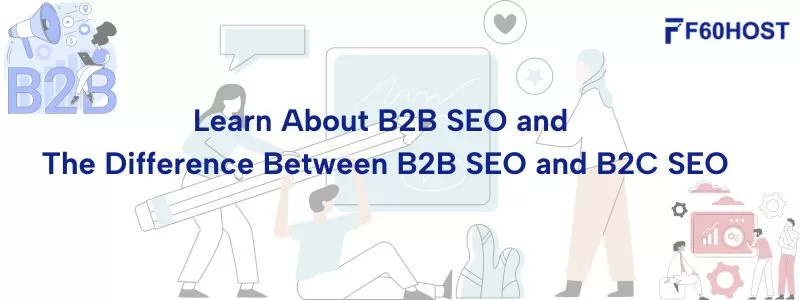Learn About B2B SEO and The Difference Between B2B SEO and B2C SEO

What Is B2B SEO?
Business-to-business search engine optimization, or B2B SEO, is the process of improving a website’s visibility and organic search ranks in search engines like Google, Bing, or Yahoo exclusively for B2B-oriented companies. Instead of concentrating on reaching and interacting with individual consumers, it targets other firms or professions.
B2B SEO entails using a variety of strategies and techniques to improve a website’s visibility in search engine results pages (SERPs) for pertinent keywords and phrases that potential B2B clients are likely to use while looking for goods, services, or information in their business. In the B2B sector, the ultimate objective is to boost organic traffic, produce leads, and ultimately encourage business conversions.
Some key aspects of B2B SEO
Finding and focusing on industry-specific keywords and search terms that suit the requirements and preferences of the B2B audience.
On-Page Optimisation:
Improving the relevance of keywords and overall search engine visibility by optimizing web page elements such as meta tags, headers, URLs, and content.
Content Creation:
Developing high-quality and informative content that addresses the pain points, challenges, and interests of the B2B audience. This can include blog articles, whitepapers, case studies, and guides.
Link Building:
Building authoritative and relevant backlinks from other reputable websites to increase the website’s domain authority and improve search engine rankings.
Technical SEO:
Making sure the website has a strong technical foundation, including proper site structure, quick loading times, mobile responsiveness, and crawl ability, to give an excellent user experience and improve search engine exposure.
Local SEO:
Making the website more visible to local B2B searchers by focusing on geo-targeted keywords, setting up and perfecting Google My Business listings, and obtaining favorable online reviews.
Analytics and tracking:
Using online analytics tools to monitor website performance, evaluate the success of B2B SEO campaigns, and make data-driven adjustments.
By putting these methods into practice, B2B businesses may improve their online exposure, successfully connect with their target audience, and produce qualified leads that could ultimately lead to new business prospects.
SEO is a process that is always being improved. Keep track of your rankings on a regular basis, refresh your content, and modify your strategy in response to shifts in search engine algorithms and market trends. To maintain and enhance your search exposure, keep up with the most recent SEO best practices.
The Difference Between B2C and B2B SEO
Business-to-business SEO (B2B SEO) and business-to-consumer SEO (B2C SEO) are two separate types of search engine optimization that are focused on various target markets and marketing methods. The main variations between the two are as follows:
1. Target Audience:
B2B SEO focuses on luring and enticing enterprises and industry experts, whereas B2C SEO seeks to connect with individual consumers.
2. Purchase Process:
B2B purchases typically entail more decision-makers, longer sales cycles, and higher-value transactions. B2C purchases typically have a shorter length, are more impulsive, and are motivated by personal preferences.
3. Content Focus:
The focus of B2B SEO is often on providing instructive and informative material that speaks to the unique demands, problems, and difficulties that businesses face. To appeal to the desires and goals of consumers, B2C SEO frequently focuses on the features, advantages, and emotional appeals of products.
4. Keywords and Search Queries:
Targeting more specialized and industry-specific keywords and search queries may be part of B2B SEO strategies. B2C SEO frequently focuses on larger, more general keywords that match the interests and preferences of the target audience.
5. Conversion Goals:
The primary objectives of B2B SEO are to produce leads, inquiries, and conversions that may be nurtured through the sales funnel. Direct sales and quick conversions are frequently emphasized in B2C SEO strategies.
6. Decision-Making Factors:
Business decisions are frequently influenced by B2B SEO, which takes into account elements including trust-building content, credibility, reputation, and industry experience. Price, product reviews, brand awareness, and emotional appeals are some examples of variables that B2C SEO may emphasize to encourage customer purchases.
7. Marketing Channels:
B2B SEO may make use of channels including business-focused content marketing, professional networking websites, and industry-specific directories. Social media, influencer marketing, and more extensive channels for content dissemination are frequently used in B2C SEO.
8. Relationship Building:
Due to the nature of commercial transactions, B2B SEO usually focuses on creating long-term ties and relationships. Through interesting user experiences, B2C SEO frequently seeks to increase brand loyalty and repeat business.
Despite these distinctions, it’s crucial to note that based on the particular market, product, or service being sold, there may be some overlaps and similarities in the SEO methods used by B2B and B2C organizations. In the end, it’s important to comprehend the target market and match the SEO approach to their wants and preferences.



